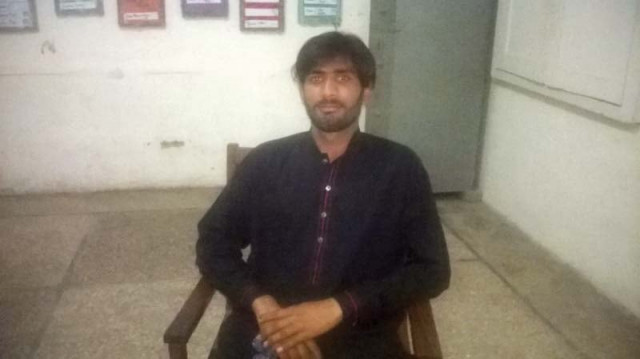Enforcing an identity crisis: A tough life didn’t hold Imran back, till he encountered NADRA
Registration authority has not processed CNIC needed for him to go to college

Imran Gul. PHOTO: EXPRESS
He was three when he was left at the shelter’s gate. Since that day, Imran Gul has not looked back. How could he, no family member has ever reached out, no relative has visited on any of the 34 Eids he spent at Darul Aman.
Even his name isn’t a connection to the life he might have had but to the life he would build with the help of the shelter. Gul was christened by the Darul Aman administration, the shelter which is now home for the 20-year-old.
Darul Aman administration official Yasmeen Awan told The Express Tribune in the 17 years since Gul was left at their door, no one has come asking for him.
Bogus NADRA help centres spark fraud warning in UK
Undocumented
She shared Gul is deaf and unable to speak. “We enrolled him at a school in Gulbahar for children who are differently-abled and he went all the way – completed his matriculation,” said Awan, clearly proud of his achievements. “But he might not be able to go to college as he does not have a CNIC [computerised national identity card].” In Pakistan, there is a high premium placed on such documentation – a plastic card with a father’s name, without which it would be impossible to do many simple things.
Before this mountain-sized bump in the road, Awan said Gul was enrolled at an institute in Hayatabad where he took his secondary school certificate exams, passing with flying colours. First year was also not a big problem as he was below 18.
Now, she added, after Gul reached second year at an institute in Islamabad, he was faced with a problem – no national identity card. “The college administration has informed us all students need a CNIC to continue with higher education,” she said. “Gul has grown up, but he is being held back by not being able to get a CNIC; in pursuing higher education and in applying for a job.”
Legal issues
Awan said she has discussed Gul’s identity card issues with legal experts but has failed to make much progress.
They applied for Gul’s CNIC two years ago but did not receive any response from National Database and Registration Authority (NADRA). “We provided them with all the legal documents [we had].”
Indian national possessing Pakistani CNIC held in Islamabad
Awan said there were hundreds of boys and girls above 18 years of age who do not have an NIC because the identity of their parents is either unknown or cannot be proven. Earlier news reports and analysis suggest NADRA has not made it easy for those orphaned to get the requisite Form B and the subsequent CNIC.
Awan demanded the government make rules for those abandoned at shelter homes, “because there are many such children in Pakistan”.
Previously Pakistan Peoples Party president Asif Ali Zardari announced—in a rather unrealistic move—his name would be mentioned in CNICs for abandoned children, instead of their father’s, but that was never implemented. Now there is a new government, said Awan.
When contacted, an official at the regional office of NADRA said they need proper documents with institutional records and registration of the person at orphanage or shelter.
However, another NADRA official said there was an option available of using the guardian’s name to get documentation. She said if the guardian does not want to put his or her name, then NADRA conducts home visits or spot verification. Officials go to interview the person who needs the CNIC or those they live with about their background. The application then goes to the NADRA vigilance office, she added.
In response to NADRA officials’ comment, Awan said Darul Aman had submitted all the required documents; NADRA has still not responded.
NADRA’s assistance sought for verification purposes
Living outside the system
Gul now finds it hard to move around the city. He avoids leaving the shelter, as law-enforcement officials at check posts stop him every now and then. When Gul does not have a CNIC to show and does not have the ability to speak and explain his situation, he gets into trouble.
Awan said. “This issue has a huge impact on the life of children who have been orphaned or abandoned. They can’t go to college or university and find it hard to get jobs.”
According to Awan, limiting the growth and reach of children who were orphaned or abandoned leads to them feeling isolated as they cannot be part of active society. Encouraging anti-social behaviour is another risk the state takes when it does not help integrate children who do not have a family structure to fall back on.
Awan shared a Canadian woman visited the shelter and desired to provide financial support for Gul. But since Gul cannot open a bank account without an identity card, donors cannot offer any help.She urged social welfare and human rights organisations to also raise this issue and pressure the government into taking this issue seriously. “Around 60 children live at the Darul Aman which has been functioning for the last 50 years with the support of Zakat.”
Soaring through
Having said this, legal and social obstacles have not managed to discourage Gul from learning and growing in any space available to him.
According to Awan, he is an intelligent young man who is tech savvy, especially when it comes to computers and mobile phones.
Published in The Express Tribune, March 16th, 2016.













COMMENTS
Comments are moderated and generally will be posted if they are on-topic and not abusive.
For more information, please see our Comments FAQ